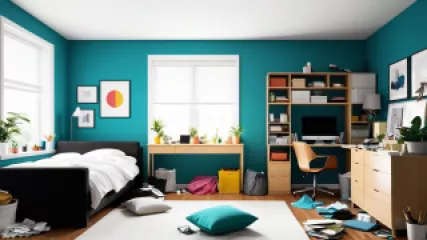How Does Clutter Impact Your Mental Health and Organization?
How Does Clutter Impact Your Mental Health and Organization?
Have you ever noticed how your physical environment can affect your mental state? It turns out that clutter, the accumulation of unnecessary items and disorganized spaces, can have a significant impact on your mental health and overall sense of organization. In this article, we will delve into the emotional effects of clutter, explore the mental health benefits of organizing, and provide practical decluttering tips to help you improve your well-being.
The Emotional Effects of Clutter
Living in a cluttered environment can lead to a range of emotional and psychological effects. Here are some ways clutter can impact your mental health:
- Increased Stress: Clutter bombards our senses, making it difficult for our brains to relax and focus. The constant visual stimuli can trigger stress responses and elevate our cortisol levels.
- Anxiety and Overwhelm: Clutter can create feelings of anxiety and overwhelm as it represents unfinished tasks and unresolved responsibilities. The presence of clutter can make us feel like we are drowning in a sea of unfinished business.
- Decreased Productivity: When surrounded by clutter, it becomes challenging to stay focused and complete tasks efficiently. The visual distractions and mental clutter can hinder productivity and prevent us from achieving our goals.
- Low Self-Esteem: Clutter can contribute to feelings of shame and low self-worth. Living in a messy environment may lead to negative self-perception and a belief that we are incapable of maintaining an organized space.
- Difficulty Relaxing: Our living spaces should ideally be sanctuaries where we can unwind and rejuvenate. However, cluttered environments can make it challenging to find peace and relaxation, further exacerbating stress levels.
Understanding the emotional effects of clutter is the first step towards recognizing its impact on our well-being. Now let's explore how organizing can positively influence our mental health.
The Mental Health Benefits of Organizing
Organizing your physical space not only helps create a visually appealing environment but also provides numerous mental health benefits. Here are some ways organization can positively impact your well-being:
- Reduced Stress and Anxiety: A tidy and organized space can promote a sense of calm and tranquility. By removing clutter, you eliminate potential stressors and create a more peaceful atmosphere.
- Increase in Productivity: When everything has a designated place, it becomes easier to locate items and complete tasks efficiently. An organized space allows for better time management and increased productivity.
- Improved Cognitive Function: Clutter competes for our attention and can overload our cognitive resources. On the other hand, an organized environment promotes mental clarity, allowing us to think more clearly and make better decisions.
- Enhanced Creativity: A clutter-free space can stimulate creativity and inspire new ideas. With less visual distractions, our minds are free to wander and explore innovative concepts.
- Boosted Self-Esteem: Taking control of your physical environment through organizing can boost self-esteem and feelings of accomplishment. It reinforces the belief that you are capable of creating order and maintaining a tidy space.
By recognizing the positive impact that organization can have on our mental health, we can begin to prioritize decluttering and implementing effective organizational strategies in our lives. Let's explore some practical tips to help you get started.
Mental Health Decluttering Tips
Decluttering can be a daunting task, especially if you have accumulated a significant amount of belongings over time. However, with a systematic approach and a little patience, you can transform your space and improve your mental well-being. Here are some tips to help you declutter:
- Start Small: Begin by tackling one area or room at a time. Breaking down the process into manageable tasks will prevent you from feeling overwhelmed.
- Set Clear Goals: Define what you want to achieve with your decluttering efforts. Whether it's creating a more organized workspace or clearing out your closet, having specific goals will keep you motivated.
- Sort and Categorize: Create separate piles for items you want to keep, donate, sell, or discard. Sort through each item and make decisions based on their usefulness and significance in your life.
- Let Go of Sentimental Attachments: It can be challenging to part with sentimental items, but remind yourself that memories live within you, not within physical possessions. Keep only those items that truly bring you joy and serve a purpose.
- Develop Systems and Storage Solutions: Invest in storage solutions that suit your needs and help maintain an organized space. Label containers, establish designated areas for specific items, and create systems to prevent future clutter accumulation.
- Practice Regular Maintenance: Decluttering is an ongoing process. Make it a habit to regularly assess your belongings and identify items that no longer serve you. Regular maintenance will help prevent clutter from accumulating again.
Remember, decluttering is not a one-time task but rather a continuous practice that can positively impact your mental health in the long run. Embrace the journey towards a more organized and clutter-free life.
Conclusion
Clutter can have a profound impact on our mental health and overall sense of organization. By understanding the emotional effects of clutter and recognizing the mental health benefits of organizing, we can take steps to improve our well-being. Decluttering our physical spaces not only reduces stress and anxiety but also enhances productivity, cognitive function, and self-esteem.
Implementing practical decluttering tips, such as starting small, setting clear goals, and developing organizational systems, can help us create a more harmonious living environment. Remember, the process of decluttering is ongoing, requiring regular maintenance and a commitment to preventing future clutter accumulation.
Take charge of your mental health and organization by embracing the power of decluttering and organizing. Clear your physical space, free your mind, and create a nurturing environment that promotes well-being and peace.






